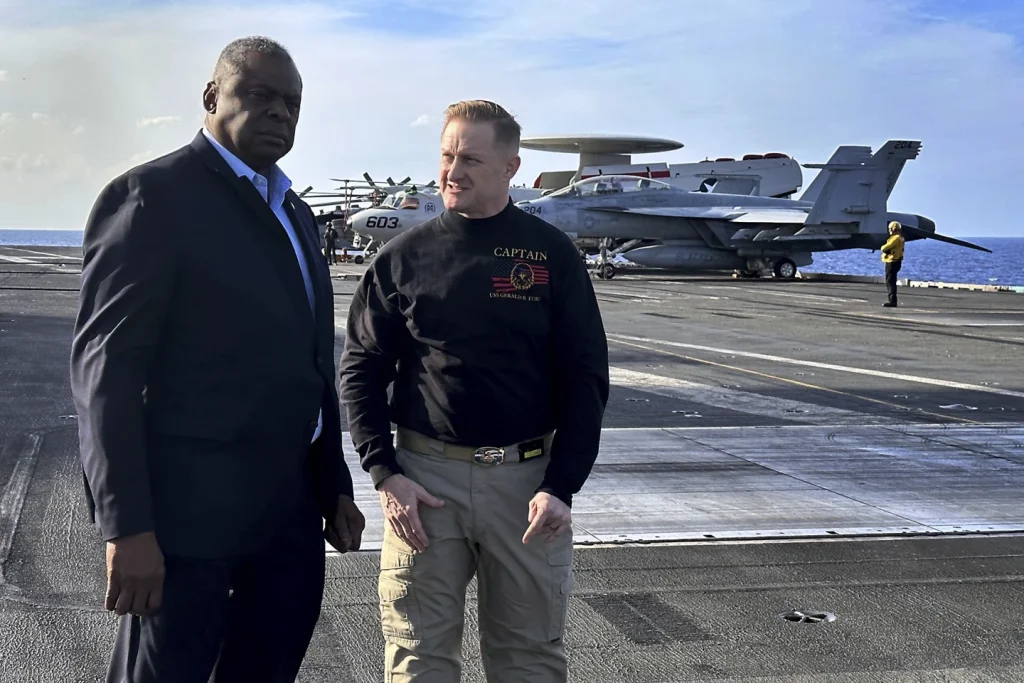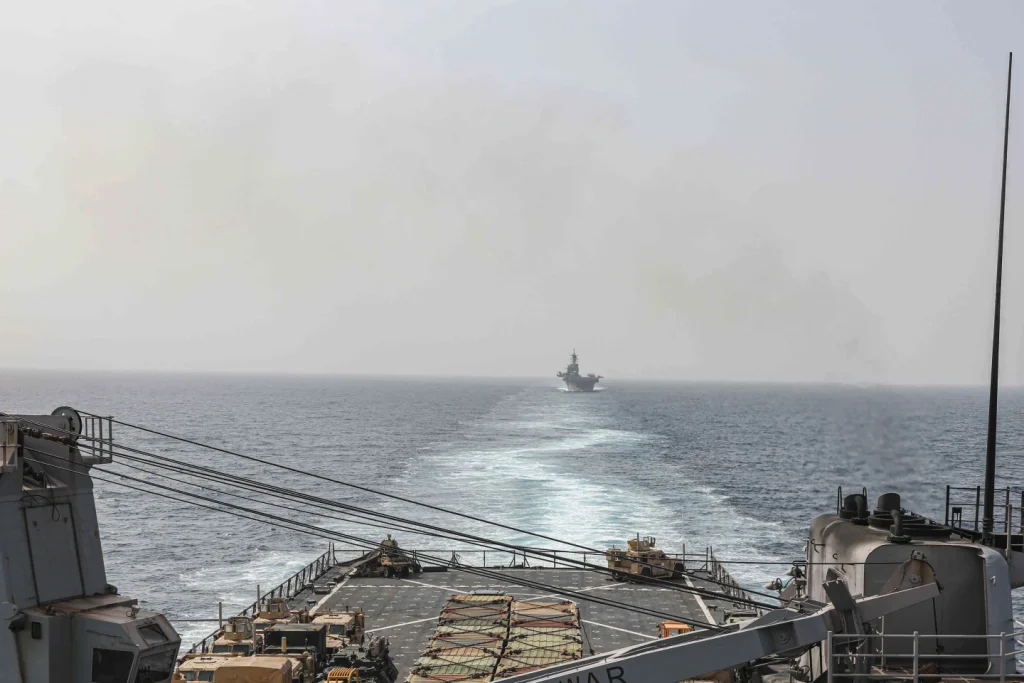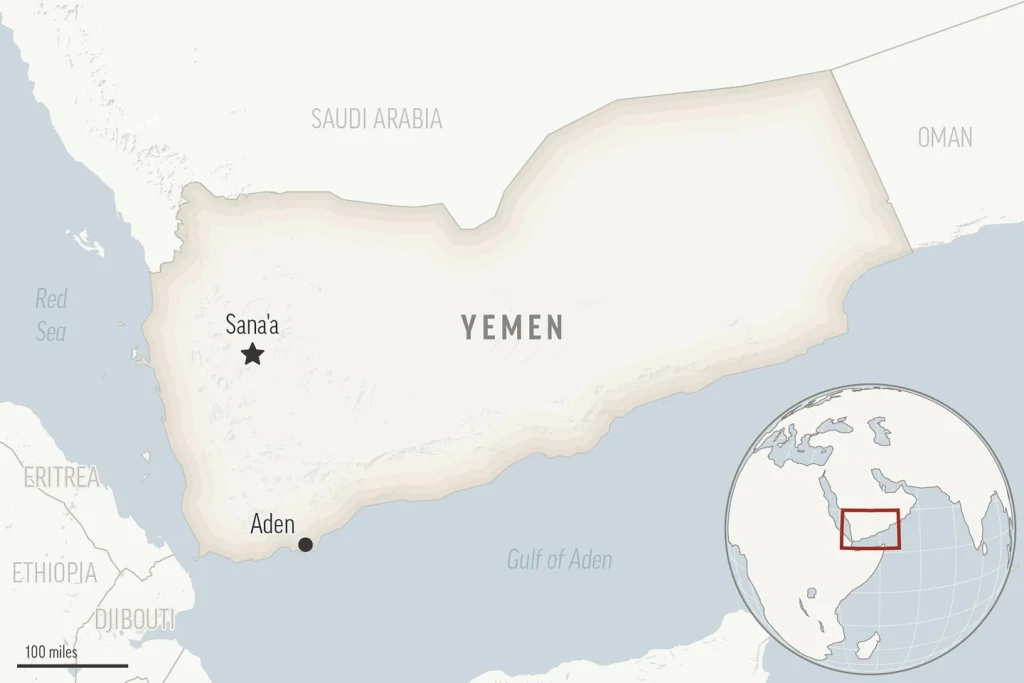The recent events in the Red Sea have once again brought to the forefront the complex and volatile nature of maritime conflicts linked to ongoing regional wars.
The U.S. military’s engagement with Houthi rebels following their attack on a cargo ship has not only underscored the escalating tensions in the region but has also raised questions about the broader implications of such confrontations.
This incident, which resulted in the killing of several Houthi fighters, has prompted discussions about the necessity of self-defense measures and the potential ramifications of further military action in the region.
The U.S. Central Command’s announcement regarding the engagement with Houthi rebels detailed a series of events that culminated in the use of force by U.S. forces.
The USS Gravely destroyer, in response to an attack on the Singapore-flagged Maersk Hangzhou, intercepted anti-ship ballistic missiles and subsequently engaged with small boats that targeted the cargo ship with small arms fire.
The escalation continued as U.S. Navy helicopters, responding to the distress call from the Maersk Hangzhou, were fired upon by the attackers, leading to the sinking of three of the four boats and the reported deaths of those on board.
The incident, while resulting in no harm to U.S. personnel or equipment, has reignited concerns about the safety of commercial shipping in the vital waterway.
The acknowledgment by the Houthis of the loss of 10 of their fighters in the confrontation, coupled with their warning of consequences, has further raised the stakes in an already tense situation.
The possibility of a preemptive strike against the Houthis to safeguard commercial shipping in the region has been a subject of speculation, prompting discussions about the potential implications of such a course of action.
The White House’s National Security Council, in response to inquiries about preemptive measures, has been circumspect, hinting at the complexities and sensitivities surrounding the issue.
The implications of the U.S. military’s engagement with the Houthi rebels extend beyond the immediate context of the Red Sea.
The incident has sparked debates about the broader regional dynamics and the interconnectedness of conflicts in the Middle East.

The war in Gaza, often intertwined with regional power struggles, has been cited as a factor contributing to the maritime conflict in the Red Sea.
The involvement of external actors, such as the United States, in these conflicts has added another layer of complexity to an already intricate geopolitical landscape.
The use of force by the U.S. military in the Red Sea has also reignited discussions about the legal and ethical dimensions of such actions.
The principle of self-defense, as invoked by a White House official, has been at the center of these debates, with questions being raised about the threshold for justifying military intervention in response to perceived threats.
The complexities of applying international law in the context of asymmetric warfare and non-state actors have further complicated the discourse surrounding the incident.
Moreover, the incident has underscored the vulnerability of commercial shipping in strategically important waterways and the potential impact of such confrontations on global trade and security.
The Red Sea, a crucial maritime route connecting the Mediterranean and the Indian Ocean, serves as a vital artery for international trade.
Any disruption to the free flow of shipping in this region has the potential to reverberate across global markets, impacting economies and geopolitical dynamics far beyond the immediate theater of conflict.
The aftermath of the engagement between the U.S. military and Houthi rebels has also highlighted the delicate balance of power and the potential for further escalation in an already volatile region.
The warning of consequences by the Houthis, coupled with the ambiguity surrounding the potential for preemptive measures, has added an element of uncertainty to an already precarious situation.
The risk of unintended escalation and the potential for a wider conflict loom large, raising concerns about the stability and security of the region.
In conclusion, the recent engagement between the U.S. military and Houthi rebels in the Red Sea has brought to the fore a multitude of complex and interrelated issues.
The incident, while rooted in a specific context, has broader implications that extend beyond the immediate theater of conflict.
It has reignited debates about the complexities of regional conflicts, the legal and ethical dimensions of military intervention, and the interconnectedness of global security and trade.
As the situation continues to unfold, it is imperative for stakeholders to navigate these complexities with prudence and foresight, mindful of the potential ramifications of their actions on regional stability and international security.
The recent statements made by John Kirby on ABC’s “Good Morning America” regarding the United States’ stance on protecting shipping in the region have sparked significant debate and concern.
Kirby’s assertion that the U.S. will take necessary measures to safeguard its national security interests and act in self-defense has raised questions about the potential escalation of conflict and the broader implications for international relations.
The context of Kirby’s remarks stems from the 23rd illegal attack by the Houthis on international shipping since November 19, with the Maersk Hangzhou incident marking a significant escalation.
The U.S. Navy’s involvement in retaliatory action against Houthi fighters represents a notable shift in the dynamics of the conflict, particularly in the Red Sea region.
The claims made by Iran-backed Houthis regarding their attacks on ships in the Red Sea, purportedly linked to Israel or heading to Israeli ports, have further complicated the situation.
Their assertion that these attacks aim to counter Israeli military actions in the Gaza Strip following Hamas’ offensive in southern Israel has added a layer of geopolitical complexity to the conflict.
As the attacks persist, the purported links to the targeted ships have become increasingly ambiguous, raising doubts about the true motives behind the rebel assaults.
This ambiguity has fueled speculation and heightened concerns about the potential for further destabilization in the region and its broader impact on global maritime security.
The evolving nature of the situation demands a careful and nuanced approach from the international community, particularly from key stakeholders such as the United States.
The need to balance the protection of national security interests with the imperative of preventing an escalation of conflict is paramount.
The United States’ response to the escalating attacks and its commitment to act in self-defense underscores the gravity of the situation.
However, the lack of clarity regarding the specific measures that may be taken, as alluded to by Kirby, has left room for speculation and uncertainty.
The broader implications of these developments extend beyond the immediate security concerns in the region.

They raise questions about the efficacy of existing diplomatic channels and the potential for multilateral cooperation to mitigate the escalating tensions.
Moreover, the impact on global trade and maritime commerce cannot be overlooked, as disruptions in shipping routes can have far-reaching economic consequences.
In navigating this complex and volatile landscape, it is imperative for all parties involved to exercise restraint and engage in constructive dialogue to prevent further escalation.
The need for transparent communication and a concerted effort to address the root causes of the conflict is essential in charting a path towards de-escalation and long-term stability.
The events surrounding the attacks on international shipping in the Red Sea underscore the interconnectedness of global security and the imperative of collaborative efforts to address emerging threats.
As the situation continues to unfold, it is crucial for the international community to remain vigilant and proactive in seeking peaceful resolutions to prevent further destabilization and safeguard the principles of maritime security and international law.
In conclusion, the recent statements and actions by the United States in response to the attacks on international shipping by the Houthis have brought the issue of maritime security to the forefront of global discourse.
The complexities and implications of these developments necessitate a measured and deliberate approach from all stakeholders to ensure the preservation of peace and stability in the region and beyond.
In recent weeks, the escalating conflict in Yemen and the Red Sea has captured global attention, prompting urgent calls for action from political leaders and international organizations.
The chairman of the House Intelligence Committee, in conjunction with the top commander of U.S. naval forces in the Middle East, has underscored the need for decisive measures to address the growing threat posed by Houthi rebels and their destabilizing activities in the region.
Furthermore, the Denmark-based shipping giant Maersk’s decision to suspend shipping through the Red Sea following attacks on its freighter serves as a stark reminder of the serious implications of the ongoing crisis.
The call for action is underscored by the recognition of Iran’s support for Hamas, Hezbollah, and the Houthis. Rep.
Mike Turner, R-Ohio, has urged the Biden administration to adopt a more aggressive stance in responding to the escalating activities of Iran.
The gravity of the situation is further emphasized by the formation of a new international coalition, comprising the United Kingdom, Bahrain, Canada, France, Italy, the Netherlands, Norway, Seychelles, Spain, and the United States, aimed at safeguarding vessels navigating the vital waterway.
The establishment of Operation Prosperity Guardian by the Pentagon, designed to counter the attacks, has seen over 1,200 merchant ships pass through the Red Sea region without being targeted by drone or missile strikes.
The decision by Maersk to suspend shipping through the Red Sea, coupled with the continued “reckless” attacks on commercial ships by Houthi rebels, underscores the urgency of the situation.
The need for a thorough investigation into the recent incidents and a comprehensive assessment of the security situation is paramount.
The international maritime mission to protect vessels in the Red Sea is indicative of the growing concern and the need for a coordinated, multilateral response to safeguard trade traffic and ensure the safety of commercial and military vessels in the region.
The escalating crisis in Yemen and the Red Sea demands a multifaceted approach that addresses the root causes of the conflict, ensures the security of maritime trade routes, and holds accountable those responsible for the destabilizing activities in the region.
The international community must work collectively to address the challenges posed by the Houthi rebels and their disruptive actions, as well as the broader implications of Iran’s support for such groups.
A comprehensive strategy should encompass diplomatic efforts, targeted sanctions, and robust maritime security measures to deter and prevent further attacks on commercial and military vessels.
As the situation continues to evolve, it is imperative for world leaders and international organizations to demonstrate unity and resolve in addressing the crisis in Yemen and the Red Sea.
The safety and security of maritime trade routes are of paramount importance, and concerted efforts are essential to mitigate the risks posed by the ongoing conflict.
The establishment of the international coalition and the Pentagon’s Operation Prosperity Guardian represent significant steps toward enhancing maritime security in the region.
However, sustained and coordinated action will be crucial in effectively addressing the multifaceted challenges posed by the escalating crisis.
In conclusion, the escalating crisis in Yemen and the Red Sea demands urgent attention and concerted international action.

The recent attacks on commercial ships and the suspension of shipping through the Red Sea underscore the gravity of the situation and the need for a coordinated, multifaceted response.
The international community must work together to address the root causes of the conflict, ensure the security of maritime trade routes, and hold accountable those responsible for the destabilizing activities in the region.
Only through collective action and unwavering commitment can the challenges posed by the crisis be effectively addressed and the safety of commercial and military vessels in the region be safeguarded.
